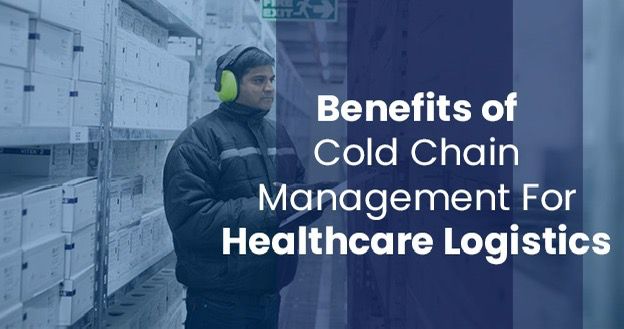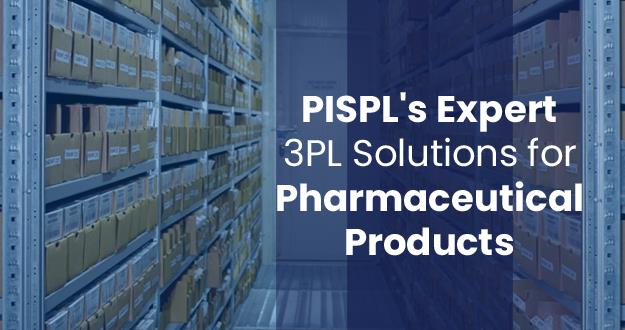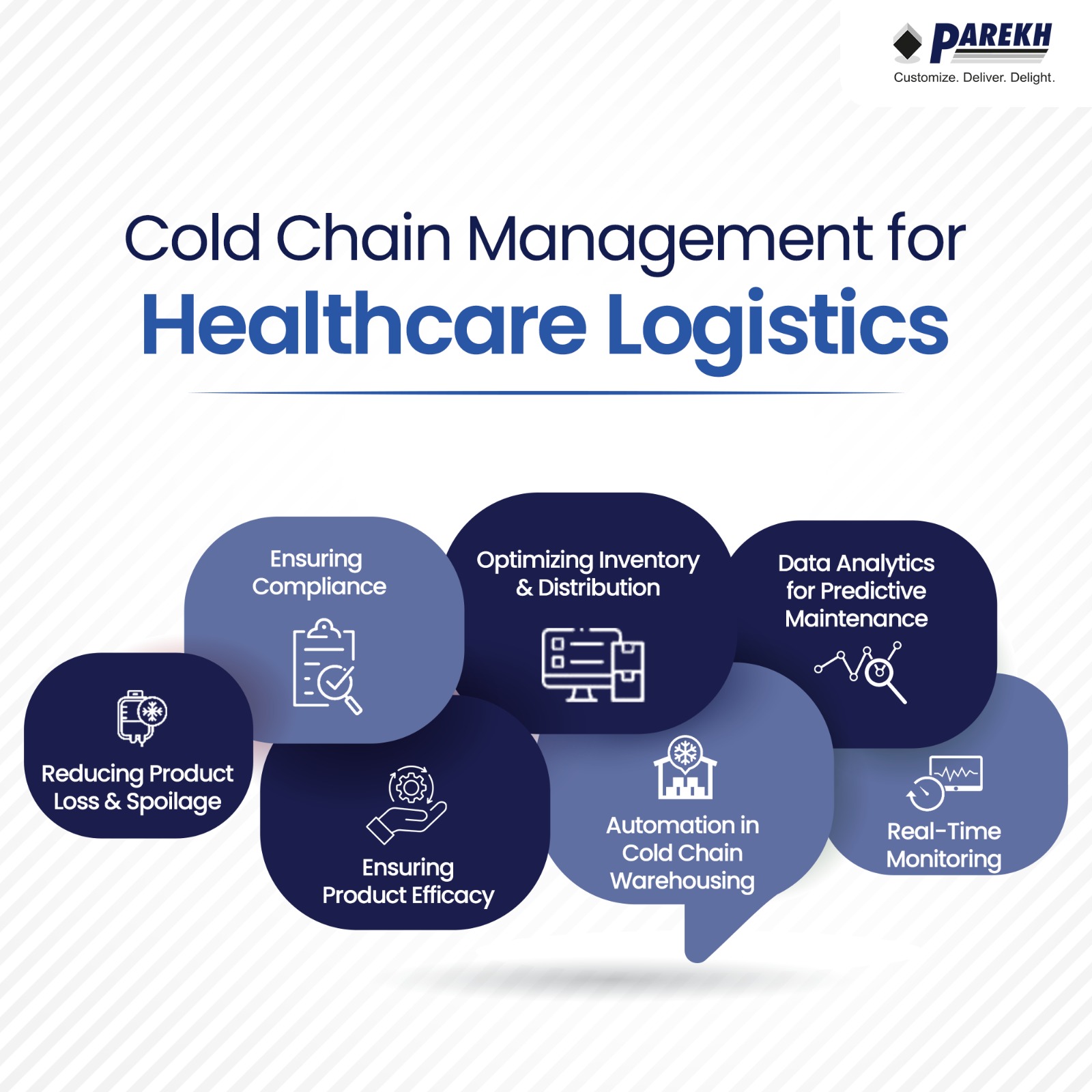
Published on:13-11-2024
Author : PISPL Editor Team
How Cold Chain Management is Revolutionizing Healthcare Logistics
In today’s rapidly evolving Healthcare sector, the role of Healthcare logistics is becoming more crucial than ever before. From delivering life-saving vaccines to ensuring the timely arrival of temperature-sensitive pharmaceuticals, efficient supply chain management is the backbone of a successful healthcare system. Among the many advancements transforming the logistics supply chain, cold chain management is emerging as a game-changer, particularly for temperature-sensitive products. This revolutionary approach is ensuring the safety, efficacy, and timely delivery of critical healthcare products, making cold chain management a pivotal component of healthcare supply chain solutions.
Why is Cold Chain Management Essential in Healthcare Logistics?
1. Maintaining Product Integrity:
The healthcare supply chain includes a number of products for which maintaining precise temperature ranges is critical. Efficient Cold chain management ensures that vaccines, biologics, blood products, and other temperature-sensitive items are transported and stored under optimal conditions. Even a minor deviation in temperature can drastically affect product efficacy, making Healthcare logistics a critical player in patient safety and care.
For example, certain COVID-19 vaccines, required storage at ultra-cold temperatures of -70°C. Without robust cold chain solutions, it would not have been possible to distribute these vaccines globally. Cold chain management ensures that healthcare products retain their quality from the point of production to their final delivery.
2. Ensuring Compliance with Healthcare Regulations:
The Healthcare logistics sector is one of the most heavily regulated industries, with stringent guidelines enforced by organizations such as the FDA, WHO, and EMA. Cold chain logistics plays a vital role in adhering to these regulations, ensuring that pharmaceuticals and medical products are stored and transported as per stipulated global standards.
By maintaining stringent temperature control, cold chain management enables healthcare companies to avoid costly fines, product recalls, or compromised patient outcomes. Regulatory bodies often require detailed records of temperature monitoring throughout the healthcare supply chain, and advanced cold chain systems are capable of delivering comprehensive documentation to meet these standards.
Cold Chain Management and Supply Chain Efficiency
1. Reducing Product Loss and Spoilage:
One of the most significant benefits of proper cold chain management in Healthcare logistics is the reduction of product waste. Temperature-sensitive healthcare products, including vaccines, insulin, and biologics, are highly susceptible to spoilage if not stored under the correct conditions. According to the WHO, approximately 50% of vaccines are wasted each year due to issues with cold chain management.
With the implementation of IoT-enabled temperature sensors and real-time tracking, supply chain management professionals can monitor products continuously and address temperature excursions before they result in spoilage. This capability enhances efficiency in the logistics supply chain, saving both costs and resources.
2. Supporting Global Healthcare Supply Chains:
As healthcare becomes more globalized, the need for reliable cold chain logistics has grown exponentially. Many healthcare products are now manufactured and distributed on a global scale, meaning they must withstand long-distance transportation while maintaining strict temperature controls.
Healthcare logistics providers are increasingly relying on advanced cold chain systems to ensure that products reach their destination in optimal condition. Whether it’s transporting insulin across continents or ensuring that biologics reach hospitals in remote locations, cold chain management is indispensable to the modern healthcare supply chain.
3. Optimizing Inventory and Distribution:
Cold chain management also streamlines inventory and distribution processes. By accurately predicting the temperature requirements and storage capacities for different products, healthcare providers can optimize stock levels and reduce excess inventory. This is particularly important in a sector where product demand can fluctuate significantly, such as during flu seasons or global health emergencies like the COVID-19 pandemic.
With advanced supply chain management tools, companies can better plan for surges in demand, ensuring that their logistics supply chain remains agile and responsive. By reducing delays and maintaining temperature control, Healthcare logistics providers can keep essential products in stock, improving patient care and overall system efficiency.
Technology Driving Cold Chain in Healthcare Logistics
1. Real-Time Monitoring:
Technology has played a significant role in revolutionizing Healthcare logistics, especially in cold chain management. IoT-enabled devices provide real-time monitoring of temperature-sensitive shipments, allowing for instant alerts if a temperature deviation occurs. These systems help logistics providers make immediate corrections, reducing the risk of product spoilage and ensuring consistent temperature control across the healthcare supply chain.
2. Data Analytics for Predictive Maintenance:
Data analytics is another technological advancement that is transforming cold chain logistics in healthcare. By analyzing historical data, logistics providers can predict potential risks in the logistics supply chain and take preventive actions before problems arise. This predictive maintenance helps ensure the integrity of temperature-sensitive healthcare products throughout the supply chain management process.
3. Automation in Cold Chain Warehousing:
Automation is increasingly becoming a staple in cold chain warehousing for healthcare products. Automated storage and retrieval systems, coupled with temperature control, allow for faster and more efficient handling of healthcare products. These technologies help reduce human error and ensure compliance with strict regulations in the healthcare industry.
The Future of Cold Chain Management in Healthcare Logistics
As the demand for precision and safety in Healthcare logistics continues to rise, cold chain management will remain a cornerstone of the healthcare supply chain. New technological innovations, such as AI and blockchain, will further enhance the capabilities of cold chain logistics, providing even greater transparency, traceability, and efficiency.
The global healthcare landscape is evolving, and supply chain management must keep pace with the growing complexities. By investing in advanced cold chain management systems, healthcare providers and logistics companies can ensure the safe, compliant, and efficient delivery of temperature-sensitive products, thereby improving patient outcomes and contributing to the overall success of the healthcare supply chain.
Conclusion
The importance of cold chain management in Healthcare logistics cannot be overstated. By maintaining strict temperature controls, optimizing the distribution of products, and leveraging cutting-edge technology, cold chain management is revolutionizing the logistics supply chain and ensuring the safe delivery of critical healthcare products across the globe.
Whether you are managing vaccines, pharmaceuticals, or biologics, having a reliable cold chain system is essential for meeting regulatory standards, reducing product spoilage, and enhancing patient care. As the healthcare sector continues to evolve, so too will the role of cold chain logistics in shaping the future of global healthcare delivery.
Partner with PISPL for comprehensive Healthcare logistics solutions and experience the advantages of precision, compliance, and seamless delivery. With PISPL by your side, you gain access to state-of-the-art cold chain infrastructure and industry expertise, ensuring your healthcare supply chain operates efficiently at every stage.
Recent Post

Advantages of Multiclient Warehousing for Scalable and Flexible Logistics Solutions

Achieving Scalability in Logistics Through Strategic Warehouse Management

How Cold Chain Management is Revolutionizing Healthcare Logistics

Why Choose PISPL as Your Pharma Logistics Solution Provider
